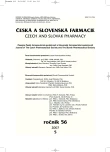-
Medical journals
- Career
Oxidative stress and its role in respiratory diseases
Authors: M. Kottová; J. Pourová; M. Vopršalová
Authors‘ workplace: Univerzita Karlova v Praze, Farmaceutická fakulta v Hradci Králové, katedra farmakologie a toxikologie
Published in: Čes. slov. Farm., 2007; 56, 215-219
Category: Review Articles
Overview
Insufficient elimination of free radicals can induce a number of harmful effects including a damage of important molecules, injury of genetic information and failure of the control and regulatory processes, and even may contribute to malignancy. Free radicals probably participate in various respiratory diseases (e.g. adult respiratory distress syndrome, chronic obstructive pulmonary disease, chronic bronchitis, asthma). Antioxidants, as substances neutralizing effect of free radical, contribute to the protection of organism. Both many exogenous substances, e.g. enzymes, and exogenous substances, e.g. vitamins and some medicaments, have antioxidant properties. An efficacious supplementation is conditioned by an appropriate knowledge of health state and of needs of organism and also by understanding of the oxidative-antioxidative system and its equilibrium.
Key words:
free radicals – oxidative stress – antioxidants – respiratory diseases
Labels
Pharmacy Clinical pharmacology
Article was published inCzech and Slovak Pharmacy

2007 Issue 5-
All articles in this issue
- Oxidative stress and its role in respiratory diseases
- Cytochrome P450 3A polymorphism and its importance in cyclosporine and tacrolimus therapy in transplanted patients
- Abiotic elicitation of Trifolium pratense L. Suspension culture
- Effect of vanadium compounds on the growth and production of coumarins in the suspension culture of Angelica archangelica L.
- Effect of thermal curing of the ethyl cellulose film on the rapidity of release of diclofenac sodium from pellets
- Mucoadhesive tablets for oral administration of ciclopiroxolamine
- Determination of valproic acid by on-line coupled capillary isotachophoresis with capillary zone electrophoresis with conductometric detection
- Czech and Slovak Pharmacy
- Journal archive
- Current issue
- Online only
- About the journal
Most read in this issue- Mucoadhesive tablets for oral administration of ciclopiroxolamine
- Oxidative stress and its role in respiratory diseases
- Cytochrome P450 3A polymorphism and its importance in cyclosporine and tacrolimus therapy in transplanted patients
- Determination of valproic acid by on-line coupled capillary isotachophoresis with capillary zone electrophoresis with conductometric detection
Login#ADS_BOTTOM_SCRIPTS#Forgotten passwordEnter the email address that you registered with. We will send you instructions on how to set a new password.
- Career

